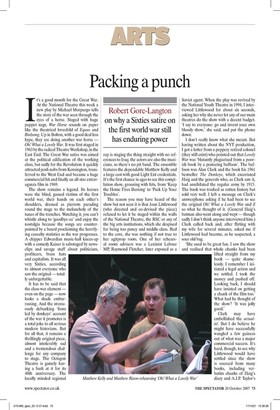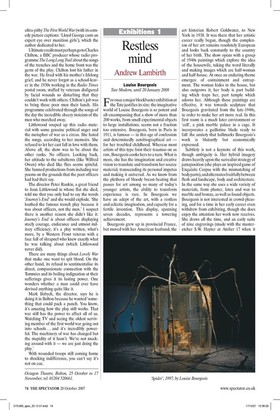Packing a punch
Robert Gore-Langton on why a Sixties satire on the first world war still has enduring power 1 t's a good month for the Great War. At the National Theatre this week a new play by Michael Morpurgo tells the story of the war seen through the eyes of a horse. Staged with huge puppet nags, War Horse sounds on paper like the theatrical lovechild of Equus and Birdsong. Up in Bolton, with a good deal less hype, they are doing another war horse — Oh! What a Lovely War. It was first staged in 1963 by the radical Theatre Workshop, in the East End. The Great War satire was aimed at the political edification of the working class, but sadly for the Revolution it quickly attracted posh nobs from Kensington, transferred to the West End and became a huge commercial hit and finally an all-star extravaganza film in 1969.
The show remains a legend. Its heroes were the blind, gassed victims of the first world war, their hands on each other's shoulders, dressed as pierrots parading round the stage to the melancholy of the tunes of the trenches. Watching it, you can't whistle along to 'goodbye-ee' and enjoy the nostalgia because the songs are counterpointed by a board proclaiming the horrifying casualty statistics as the war progresses. A chipper Edwardian music-hall knees-up with a comedy Kaiser is sabotaged by newsclips and savage stuff about politicians, profiteers, brass hats and capitalists. It was all very Sixties, according to almost everyone who saw the original — totally unforgettable.
It has to be said that the class-war element — even on the page — now looks a shade embarrassing. And the strenuously debunking 'lions led by donkeys' account of the war it promotes is a total joke to all serious modern historians. But for all that, it remains a thrillingly original piece, almost intolerably sad and a tremendous challenge for any company to stage. The Octagon Theatre is gamely having a bash at it for its 40th anniversary. The rep is staging the thing straight with no references to Iraq; the actors are also the musicians, so there's no pit band. The ensemble features the dependable Matthew Kelly and a large cast with good Light Ent credentials. It's the first chance in ages to see this compilation show, groaning with hits, from 'Keep the Home Fires Burning' to 'Pack Up Your Troubles'.
The reason you may have heard of the show but not seen it is that Joan Littlewood (who directed and co-devised the piece) refused to let it be staged within the walls of the National Theatre, the RSC or any of the big arts institutions, which she despised for being too poncy and middle-class. Red to the core, she was nothing if not true to her agitprop roots. One of her rehearsal room advisers was a Leninist Labour MP, Raymond Fletcher, later exposed as a Soviet agent. When the play was revived by the National Youth Theatre in 1994, linterviewed Littlewood for about six seconds, asking her why she never let any of our main theatres do the show with a decent budget. 'I say to everyone: go and invent your own bloody show,' she said, and put the phone down.
I don't really know what she meant. But having written about the NYT production, I got a letter from a peppery retired colonel (they still exist) who pointed out that Lovely War was 'blatantly plagiarised from a poorish book by a posturing buffoon'. The buffoon was Alan Clark and the book his 1961 bestseller The Donkeys, which excoriated Haig and the generals who, as Clark saw it, had annihilated the regular army by 1915. The book was trashed as rotten history but sold very well. I left a message on Clark's answerphone asking if he had been to see the original Oh! What a Lovely War and if so what he thought of it. (General Haig's batman also went along and wept — though sadly I don't think anyone interviewed him ) Clark called back and, after flirting with my wife for several minutes, asked me if Littlewood had become, as he suspected, a sour old bag.
'She used to be and realised that great fun. I saw the show whole chunks had been lifted straight from my book — quite shamelessly. I remember I initiated a legal action and we settled. I took the money and pushed off. Looking back, I should have insisted on getting a chunk of the film too.' What had he thought of the show? 'It was jolly good.'
Clark may have embellished the actualite. But I do believe he might have successfully wangled a few guineas out of what was a major commercial success. It's hard, though, to see why Littlewood would have settled since the show is sourced from many books, including verbatim chunks of Haig's diary and A.J.P. Taylor's ultra-pithy The First World War (with its comedy picture captions: 'Lloyd George casts an expert eye over munition girls'), which the author dedicated to her.
Ultimate credit must perhaps go to Charles Chilton, a BBC producer whose radio programme The Long Long Trail about the songs of the trenches and the home front was the germ of the play. Chilton lost his father in the war. He lived with his mother's lifelong grief, and he never forgot as a school-leaver in the 1930s working in the Radio Times postal room, staffed by veterans disfigured by facial wounds so disturbing that they couldn't work with others. Chilton's job was to bring these poor men their lunch. His programme celebrated through the songs of the day the incredible cheery stoicism of the men who marched away.
Littlewood souped up this radio material with some genuine political anger and the metaphor of war as a circus. She hated the songs, according to her memoirs. She refused to let her cast fall in love with them. Above all, the show was to be about the other ranks. No officers. Looking back, her attitude to the subalterns (like Wilfred Owen) who died like flies seems spiteful. She banned productions from including war poems on the grounds that the poet officers had had their say.
The director Peter Rankin, a great friend to Joan Littlewood in whose flat she died, told me that you only had to say the words 'Journey's End' and she would explode. 'She loathed the famous trench play because it was about officers, not the men.' I suspect there is another reason she didn't like it: Journey's End is about officers displaying steely courage, endurance and utmost military efficiency; it's a play written, what's more, by a Western Front veteran with a face full of shrapnel who knew exactly what he was talking about (which Littlewood never did).
There are many things about Lovely War that make one want to spit blood. On the other hand, its refusal to sentimentalise its direct, compassionate connection with the Tommies and its boiling indignation at their sufferings gives it its lasting power. One wonders whether a man could ever have devised anything quite like it.
Mark Babych, the director, says he is doing it in Bolton because he wanted 'something that could pack a punch. You know, it's amazing how the play still works. That war still has the power to affect all of us. Watching TV and seeing the oldest surviving member of the first world war going out into schools ... and it's incredibly powerful. The machinery of war has changed but the stupidity of it hasn't. We're not mucking around with it — we are just doing the play.'
With wounded troops still coming home to shocking indifference, you can't say it's not on cue.
Octagon Theatre, Bolton, 25 October to 17 November; tel: 01204 520661.








































































 Previous page
Previous page